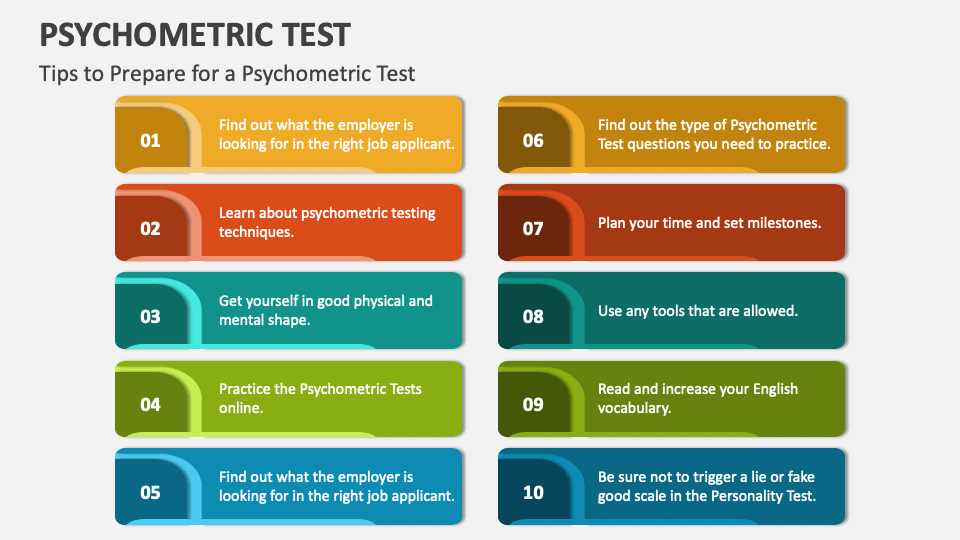Psychometric Tests: Questions, Types and Tips
Table of Contents

Have you ever been to an interview in which the most common “tell me about yourself” questions didn’t get to who you are? This is why organisations are more into implementing psychometric tests. Psychometric tests are no longer just a part of the recruitment process but a key strategy for hiring candidates. In fact, many companies consider it an effective tool for understanding a candidate’s abilities and suitability for working in an organisation. Such a test also reveals who you are and how you think, behave, and adapt to various situations.
So, if you are currently preparing for a job interview and want to know what psychometric tests are all about, this blog is completely for you. Here, we will explore the meaning of psychometric tests, their various types, a few sample psychometric test questions and answers, as well as practical tips for successfully passing psychometric tests. Let’s get started.
What is a Psychometric Test?
A psychometric test for a career is a process that allows employers to gain an earlier and deeper insight into how you think, act, and problem-solve, beyond what your CV offers. Different psychometric tests can assess different areas, including issues based on cognitive capacity, elements based on personality characteristics, and behaviours typical in a workplace. These elements help recruiters to determine if you are likely to work well in a role or have particular strong points in a career direction.
Psychometric tests come in various types, including numerical, logical, and verbal reasoning (some may also include mechanical reasoning). These tests are generally conducted online, although some assessment centres still conduct them in person.
But why do companies use psychometric tests? Simply put, these tests help make the hiring process smoother and more effective. They allow employers to identify candidates who are most likely to perform well in a specific role. Many companies, especially those running graduate programs or filling highly competitive positions, now include psychometric testing as part of their recruitment process. Depending on the job or industry, employers often use a mix of different tests to find the best fit for the role.
What Are the Different Types of Psychometric Tests for Interviews?

*blog.mettl.com
1. Aptitude Tests
Aptitude tests are done to understand whether you have the abilities needed for a specific job. Aptitude tests usually feature multiple-choice questions and have time limitations. For example, IT and science-based careers use logical reasoning quite heavily, vs finance and business-based careers that use verbal reasoning more. You may face one or many of the following tests depending on the type of role you are applying for:
Numerical reasoning
Measures whether you can work with numbers, interpret data, and complete mathematical problems.
Verbal reasoning
Assesses your ability to comprehend and evaluate written information and is typically used for roles in banking, consulting, and management.
Inductive reasoning
Challenges you to identify patterns and trends, often using diagrams or sequences.
Error checking
Catch your attention to detail by paying attention to errors in complex codes or large data sets.
Logical reasoning
Determine whether you can analyse situations and come to valid conclusions.
Diagrammatic reasoning
Tests whether you can interpret signs, symbols, and flowcharts.
2. Skills Tests
Skills assessments are designed to evaluate how adaptive you are to new things. In this type of test, the company wants to know your current skills and how capable you are of learning new things while being in your job. These can also include aptitude and problem-solving exercises to gauge how you would meet expectations with real-world experiences.
3. Personality Tests
Companies use personality tests to assess whether the candidate is the right asset for the organisation and its culture or not. They often cross-reference your answers with those of a capable manager or top-performing employee to find any common characteristics. These tests give an idea of your personality, motivation, and how you choose to meet specific goals. It involves a pattern of questions, and the exam result shows that you have a specific personality type.
Tips and Tricks for Preparing for Psychometric Tests

*collidu.com
Jumping into random practice for psychometric tests isn’t enough, but a smart, structured approach will maximize your results. Here are the easy tricks to clear your tests:
1. Know the Test Format
The first thing is to know what you will be facing. Each psychometric test has its own style, so find out what the test format is. Look for example questions, solve previous years’ papers, or take online mock tests. There are many platforms where you will find demo practice sets that replicate real testing conditions, just practice them to exactly know what to expect.
2. Practice Without Relaxing
There is no shortcut here; without practice, you will not turn the corner in measuring speed and accuracy. Try to solve numerical problems, logic puzzles and comprehension passages regularly. Here is the tip: you can download a good app where you can practice the different components of the tests that will make it more lively and engaging. Over time, you will notice your speed and accuracy build up and improve.
3. Enhance Time Management Skills
Many psychometric tests are strictly timed; thus, speed is just as important as accuracy. To train yourself to answer under time constraints, use a stopwatch during practice exercises. Your goal is not to become quick but to become comfortable answering questions correctly and efficiently under time constraints.
4. Work on Your Weaknesses
Everyone has strengths and weaknesses, and practice tests show your areas of strength and weakness very quickly. Rather than work on your strengths, devote more practice time to improving your weaker areas. The key to scoring well overall is to be balanced in your best and weakest areas.
5. Create a Thoughtful Strategy
When you go for the free psychometric test, try not to let your nerves take over. Read carefully, pace yourself, don’t rush, and if you end up stuck on one question, skip it and come back. Spending more than a few moments on all of the other problems can affect your score.
6. Take Care of Your Mental and Physical Well-being
Your brain performs best when your body is well-rested and energised. Sleep well the night before, eat a healthy meal, and drink enough water to stay sharp. If test anxiety is an issue, try quick mindfulness or breathing exercises to calm your nerves before starting.
Why Psychometric Assessments are Important in Hiring
Let’s give you a clear brief and, in more detail, about why psychometric tests are an important hiring procedure at any organisation:
1. Predicting Workplace Behaviour
Sometimes, as an interviewer, you do not get what you want in a candidate from their resume. This is where these tests come into play. By assessing personality characteristics and behavioural traits, psychometric tests provide insight into communication styles, motivations, and how well someone performs under pressure.
2. Identifying Future Leaders
Great leaders are not always what they are when you first meet them. Psychometric assessments can help identify leadership potential by outlining important skills, such as decision-making, problem-solving, and resilience. This allows organisations not just to hire for today but to develop potential leaders for the future.
3. Assessing Intelligence and Ability
In addition to evaluating personality, these assessments measure cognitive abilities (the learning speeds of individuals, their adaptability, and their ability to process information). This gives recruiters some insight into how candidates will handle unfamiliar situations, prioritise their tasks, and progress in the position.
4. Assessing Emotional Intelligence
Collaboration and teamwork all depend on emotional intelligence, wherein psychometric testing looks at how candidates recognise, express and manage internal and external emotional reactions. This allows for assessment in teamwork, anticipates how to navigate conflict, and provides an understanding of the overall culture of the workspace.
Psychometric Test Questions: Sample Answers
Here are the common psychometric test questions that you can prepare:
1. Tell me about yourself.
The main purpose of this question is to make candidates feel comfortable while also allowing recruiters a look into the respondent’s personality, background, and communication effectiveness.
2. What do you do during your free time?
Beyond hobbies, this question provides insight into current skills outside of work through extracurricular activities.
3. What do you think of our organisation?
An insightful answer will show that you have researched the company and are showing a level of genuine interest and motivation.
4. Why is this industry interesting to you as a career?
In this question, candidates are expected to connect what they have understood about the industry and connect that to their own interests and career goals.
5. Why did you choose to leave your current organisation?
Strong candidates will find a professional way to be honest about leaving for growth or a new challenge rather than outright disparaging an employer or organisation.
6. What value and contributions do you see yourself bringing to the position?
The best answers can be unique skills and previous experience that contribute to far more than the job description would suggest, and highlight what makes them unique.
7. How do you handle pressure and stress in the workplace?
This question tests for resilience and ways of coping, particularly for positions where the pressure is expected. Psychometric evaluation can offer an insight into these capabilities.
8. How do you manage the deadlines associated with multiple tasks?
Responses show organisational skills and time management styles that allow recruiters to gain insight into whether or not the candidate can perform in a high-demand position with deadlines.
9. Tell me about a time you had to adjust to an important change in the workplace.
The ability to adapt is particularly useful in changing and uncertain environments. This question will show whether or not a candidate can make quick changes in order to maintain productivity through change.
10. What is your process when you have made a mistake at work?
An appropriate answer for these psychometric questions is to show how a candidate deals with the mistake and what countermeasures they take to ensure it doesn’t happen in the future. While answering this question, a candidate can show their problem-solving abilities with an example.
11. What is your approach to making decisions?
A perfect answer would include gathering information, considering a variety of alternatives if available, collaborating with stakeholders (if necessary), and implementing solutions while measuring outcomes.
12. Tell me about a time when you were given constructive feedback. How did you handle it?
While answering this question, candidates must show that they are open to feedback, agile learners, and that they have taken steps to improve their performance.
13. What motivates you to work hard for your employer?
Responses should show acknowledged intrinsic and extrinsic motivations, such as achieving goals, growth, getting recognised, or making an impact.
14. How do you ensure that your work is accurate and detail-oriented?
Candidates might mention checklists, reviews, technology, or things they do to stay focused and decrease errors.
15. Do you prefer to work independently or on a team?
Candidates should show flexibility by supporting group work to help each team member and an independent team member when appropriate.
Conclusion
Psychometric tests are not about tricking candidates; they’re about unlocking true potential. By measuring skills, intelligence, and personality traits, they give recruiters deeper insights that traditional interviews often miss. For job seekers, they’re an opportunity to shine beyond the resume.
With the right preparation, practice, and mindset, you can approach these tests not with fear, but with confidence. Remember: it’s not just about answering correctly, it’s about showcasing your ability to think, adapt, and grow.
So, the next time you face a psychometric test, don’t panic. See it as your stage to stand out! Also, if you want to enhance your skills, Jaro Education brings a vast range of online degree courses and certification programs. These programs are designed to help you build confidence, strengthen your professional profile, and stay ahead in today’s competitive job market. Start your learning journey with Jaro Education and unlock new career possibilities today!
Frequently Asked Questions
Is it too difficult to do psychometric tests?
No, with the right practice and determination, it’s not tough to clear your psychometric tests. Also, if you need any academic guidance and support, trust the experts at Jaro Education.
Can I practice psychometric tests on the web?
Yes, you can practice a free psychometric test by solving past years’ questions, or many websites create mock tests to help you prepare for the tests.
Do most companies do psychometric tests?
Not everyone, but they are becoming more popular in certain sectors like IT, consulting, and banking.
How important is the psychometric test with the other tasks and the CV?
It is one component in the overall assessment, just like all CVs and face-to-face interviews.

















